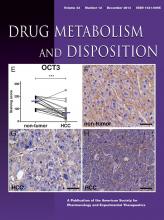Abstract
Targeted chemotherapy for hepatocellular carcinoma (HCC) is impaired by intrinsic and/or acquired drug resistance. Because drugs used in HCC therapy (e.g., anthracyclines or the tyrosine kinase inhibitor sorafenib) are substrates of uptake and/or efflux transporters, variable expression of these transporters at the plasma membrane of tumor cells may contribute to drug resistance and subsequent clinical response. In this study, the variability of expression of uptake transporters [organic cation transporter (OCT) 1 and OCT3] and efflux transporters [multidrug resistance 1 (MDR1)/P-glycoprotein, multidrug resistance protein (MRP) 1, MRP2, and breast cancer resistance protein (BCRP)], selected for their implication in transporting drugs used in HCC therapy, was investigated. HCC and corresponding nontumor tissue samples were collected from 24 Japanese patients at the time of surgery. Protein expression was determined by immunohistochemistry. Expression data were correlated with clinicopathological characteristics and patients’ outcome (median follow-up, 53 months). Generally, expression was highly variable among individual tumor samples. Yet median expression of OCT1, OCT3, and MDR1 in HCC was significantly lower (1.4-, 2.7-, and 2-fold, respectively) than in nontumor tissue, while expression of MRP2 persisted and BCRP showed a trend of increased levels in HCC. Patients with low BCRP expression had significantly shorter overall and recurrence-free survival times. Results suggest different expression patterns of drug transporters in HCC, which are associated only in part with clinicopathological characteristics. Detailed information on expression of drug transporters in HCC may be promising for individualization and optimization of drug therapy for liver cancer.
Footnotes
- Received July 9, 2014.
- Accepted September 17, 2014.
This work was supported by the Wilhelm-Sander-Stiftung, München, Germany [Grant no.2010.059.1]; by the Robert Bosch Stiftung, Stuttgart, Germany; and by the European Union [Grant FP7 PITN-GA-2009-238132].
↵
 This article has supplemental material available at dmd.aspetjournals.org.
This article has supplemental material available at dmd.aspetjournals.org.
- Copyright © 2014 by The American Society for Pharmacology and Experimental Therapeutics
DMD articles become freely available 12 months after publication, and remain freely available for 5 years.Non-open access articles that fall outside this five year window are available only to institutional subscribers and current ASPET members, or through the article purchase feature at the bottom of the page.
|







